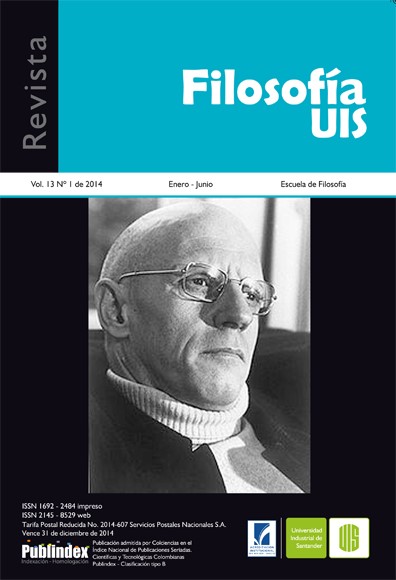The aporia of happiness: towards a Schopenhauerian hermeneutics of Goethe’s Faustus
Published 2014-04-29
Keywords
- Hermeneutics,
- will,
- existence,
- happiness,
- suffering
How to Cite
Copyright (c) 2014 Juan Diego Hernández Albarracín

This work is licensed under a Creative Commons Attribution 4.0 International License.
Abstract
This paper aims to provide an hermeneutic dynamic on Goethe’s Faustus, in which will be able to review the behavior that along with the Schopenhauer’s Will develops further enough to deny happiness as an absolute, on the contrary he denounces such feeling as a desperate need of satisfaction and a search for instant gratification, pointing that the elimination of those needs would bring a positive suffering which is the ultimate ground of our existence. The intention behind joining these two works is giving context to Schopenhauer’s views inside the poetic-literary field that offers Goethe’s work.
Downloads
References
- Calderón de la Barca, P. (1985). La vida es sueño. Madrid: Mediterráneo.
- Goethe, J. W. (1978). Fausto. México: Cumbre.
- Heidegger, M. (1989). La serenidad. Barcelona: Odos.
- Heidegger, M. (2001). Introducción a la metafísica. Barcelona: Gedisa.
- Heidegger, M. (2008). La pobreza. Buenos aires: Amorrortu.
- Nietzsche, F. (1932). Tercera consideración intempestiva: Schopenhauer como educador. Madrid: Aguilar.
- Philonenko, A. (1989). Schopenhauer: una filosofía de la tragedia. Barcelona: Anthropos.
- Safranski, R. (2008). Schopenhauer y los años salvajes de la filosofía. Madrid: Tusquets.
- Schopenhauer, A. (2000). El arte de ser feliz: explicado en 50 reglas para la vida. Barcelona: Herder.
- Schopenhauer, A. (2009). El mundo como voluntad y presentación Tomos i y ii. Madrid: Trotta.
- Séneca, L. A. (1984). Cartas morales a Lucilio. Barcelona: Orbis.
- Voltaire (2004). Cándido o el optimista. Madrid: Edhasa.
